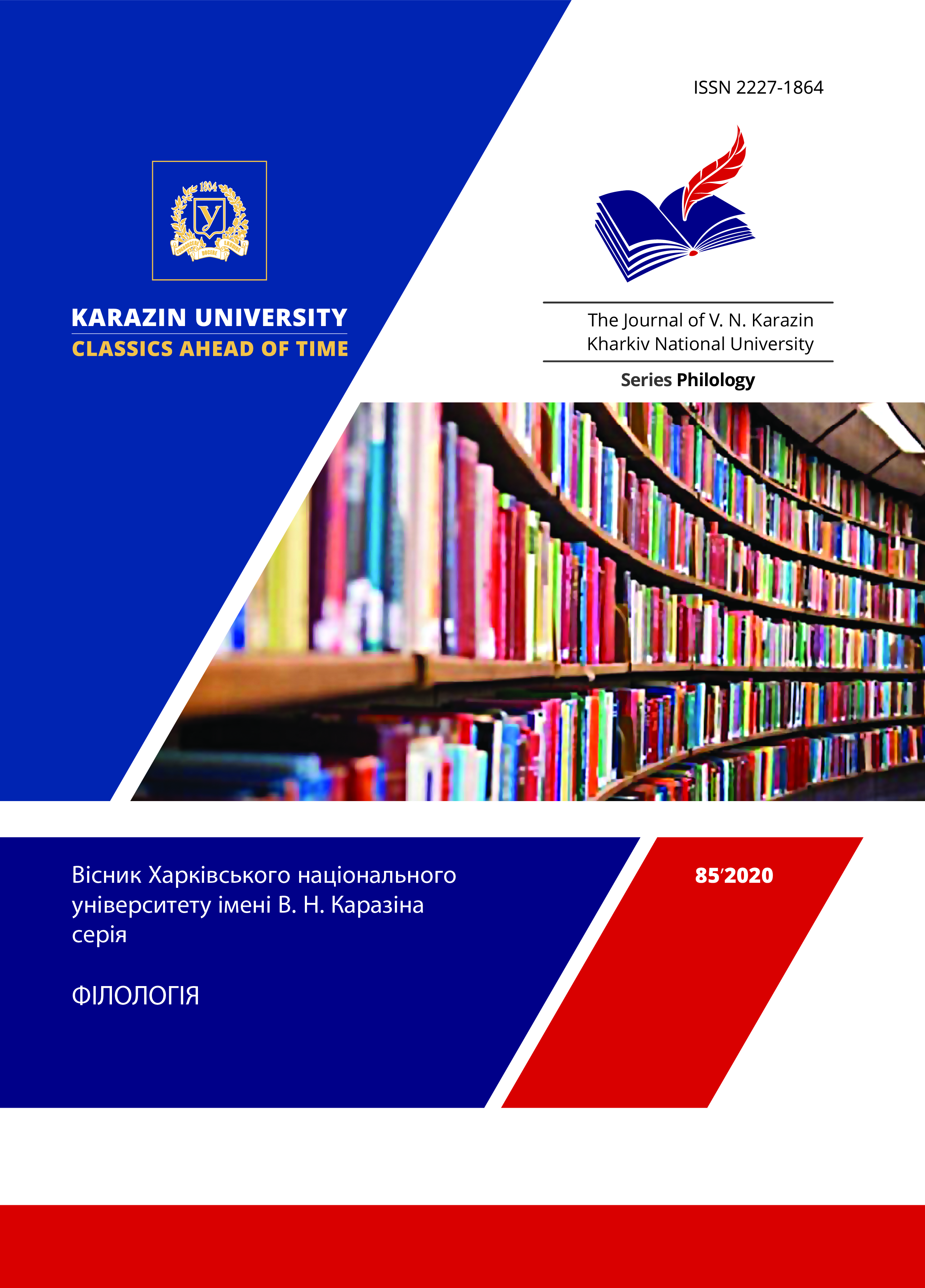The evolution of conceptual modeling of “magic” and “medical” metaphors in Ancient Greek rhetorical and philosophical discourse
Abstract
Using the theory of conceptual metaphor as a theoretical framework, this paper explores the metaphorical use of the magical and / or medical concepts in Gorgias, Empedocles, Plato, Dionysius of Halicarnassus and Pseudo-Longinus. It examines how a deep level of the cognitive image of magic and medicine echoes ‘frames’ that constitute the target domain of rhetoric in the Ancient Greek language. This study focuses on Gorgias’ speech “Encomium of Helen” as both the one of the earliest and most representative in the use of such conceptual metaphors within Ancient Greek rhetorical and philosophical discourses. Judging by the text of Gorgias and other works of Ancient Greek literature, the slots of the source domain of the metaphor intersect with the etymological bases of the magic lexicon (“power”; “sound suggestion” and “formation of visual images”), and are supplemented by new ones (“unnatural influence”, “efficiency”; “carelessness of target audience”, “change of emotional and cognitive state”). This Gorgias model of rhetorical influence found its fruitful application in Plato and rhetoricians of the Hellenistic-Roman period, though with diametrically opposite axiological meanings: negative in Plato and positive in Dionysius of Halicarnassus and Pseudo-Longinus. Indeed, in Hellenistic rhetorical theory, negatively marked slots of the metaphorical frame disappeared (probably because of the influence of the then-current views in medicine), as well as concepts with ambivalent treatment, such as φάρμακον. Finally, it seems that among the above-mentioned authors the only one who has paid attention to the methodological similarity between rhetoric and medicine, given the medical terms and metaphors used by Gorgias, was Plato.
Downloads
References
Bugayeva L.D. (2018). Metafora v intertekste [Metaphor in intertext] Inter-tekstual'nyy analiz: printsipy i granitsy: sb.nauchn.statey [Intertextual analysis: principles and boundaries: collection of scientific articles] St.Petersburg : Publishing House of St.Petersburg.university, 49–64.
Derrida J. (1968) Farmatsiya Platona [Pharmacy of Plato] Tel Quel. nos 32–33. Available at: http://pharmacie.narod.ru/
Kobozeva I.M. (2002) K formal'noy reprezentatsii metafor v ramkakh kognitivnogo podkhoda [To the formal representation of metaphors in the framework of the cognitive approach] Trudy mezhdunarodnogo seminara «Komp'yuternaya lingvistika i intellektual'nyye tekhnologii» [Proceedings of the international seminar "Computer Linguistics and Intelligent Technologies"]. Moscow : Nauka, 188–194. Available at: http://www.dialog-21.ru/digest/2002/articles/kobozeva/
Kul’chytskaya L.V. (2012) Ponyattya «kohnityvnoyi» ta «kontseptualʹnoyi» metafory u vlasniy linhvistytsi rannekohnitnoho period [The concepts of “cognitive” and “conceptual” metaphor in Russian linguistics of the early cognitive period]. Visnyk derzhavnoho universytetu. Romano-hermansʹka filolohiya [Bulletin of the State University. Romano-Germanic Philology]. no. 11, 85-90.
Lakoff J. (2004) Metafory, kotorymi my zhivem [Metaphors that we live by] Moscow : Editorial URSS. 256 p. (in Russian)
Polishchuk A.S. (2019) Kontseptualʹna metafora Horhiyi «rytoryka yak mahiya» ta yiyi evolyutsiya u rytorychnykh traktatakh klasychnoho ta ellinistychnoho periodiv Science and Education a New Dimension. Philology. vol. VII (57). no. 191, 44-50.
Salatova L. M., Surmeneva J.V. (2017) Morbial'naya metafora politicheskogo krizisa na Ukraine v masmediynykh diskursakh Rossii i SSHA [Morbial metaphor of the political crisis in Ukraine in the media discourses of Russia and the USA] Filologicheskiye nauki. Voprosy teorii i praktiki [Philological Sciences. Questions of theory and practice] Tambov: Gramota, no. 5, vol. 71, part. 1., 140–144.
Ulman S. (1970) Semanticheskiye universalii [Semantic universals] Novoye v lingvistike [New in linguistics] Moscow : Progress, vol. 5, 250–299.
Chudinov A. P. (2001) Sportivnaya metafora v sovremennom rossiyskom politicheskom diskurse [Sports metaphor in contemporary Russian political discourse] Vestnik VGU, Seriya lingvistika i mezhkul'turnaya kommunikatsiya [Bulletin of the Voronezh State University, Series of Linguistics and Intercultural Communication] Voronezh (electronic jounal), vol. 2, 26–31. Available at: http://www.vestnik.vsu.ru/content/lingvo/2001/02/toc_ru.asp
Allison E. Das. Health, Harm, and the Civic Body: Medical Language in the Speeches of Demosthenes. Greek, Roman, and Byzantine Studies, 2019. Is. 59 P. 340–367.
Beekes R. (2010) Etymological Dictionary of Greek / R. Beekes with the assist. of L. van Beek, vol. І-ІІ. Leiden and Boston: Brill.
Cheak A. (2004) Magic through the Linguistic Lenses of Greek mágos, Indo-European *mag(h)-, Sanskrit mâyâ and Pharaonic Egyptian heka // Journal for the Academic Study of Magic, no. 2, 260–286.
Collins D. (2008) Magic in the Ancient Greek World. – Blackwell Publishing Ltd. 207 p.
Curbera J.B., Jordan D.R. (2007) The language of Greek katadesmoi and magical papyri. A history of Ancient Greek: from the Beginnings to Late Antiquity. Cambridge : Cambridge University Press, 1347–1354.
Dickie M. W. (2005) Magic and magicians in the Greco-Roman world. – London & NY : Taylor & Francis e-Library. 371 p.
van der Eijk Ph. J. (2005) The heart, the brain, the blood and the pneuma: Hippocrates, Diocles and Aristotle on the location of cognitive processes. Medicine and Philosophy in Classical Antiquity: Doctors and Philosophers on Nature, Soul, Health and Disease. Cambridge University Press, 119–138.
Entralgo L. Therapy of the Word in Greek Medicine. Baltimore: The Johns Hopkins Press, 1970. 212 p.
Gaillard-Seux P. (2014) Magical formulas in Pliny’s natural History: origins, sources, parallels. ‘Greek’ and ‘Roman’ in Latin Medical Texts: Studies in Cultural Change and Exchange in Ancient Medicine. Leiden: Brill, 201–223.
de Jonge C.C. (2008) The magic of poetic speech: Gorgias, Dionysius and ‘Longinus’. Between grammar and rhetoric: Dionysius of Halicarnassus on language, linguistics and literature. Leiden, Boston: Brill, 332–366.
Maillat D., Oswald S. (2009) Defining Manipulative Discourse: The Pragmatics of Cognitive Illusions. International Review of Pragmatics, vol. 1, 348–370.
Pokorny Ju. (1951) Indogermanisches etymologisches Wörterbuch. Bern: Francke.
Rigotti E. (2005) Towards a typology of manipulative processes. Manipulation and Ideologies in the Twentieth Century: Discourse, language, mind. John Benjamins Publishing Company, 61–83.
Roth A. D. (2008) Reciprocal influences between rhetoric and medicine in ancient Greece. [PhD Thesis]. University of Iowa, 1–134. Available at: https://ir.uiowa.edu/cgi/viewcontent.cgi?article=1188&context=etd
Untersteiner M. The Sophists. Oxford: Blackwell, 1954. 361 p.




